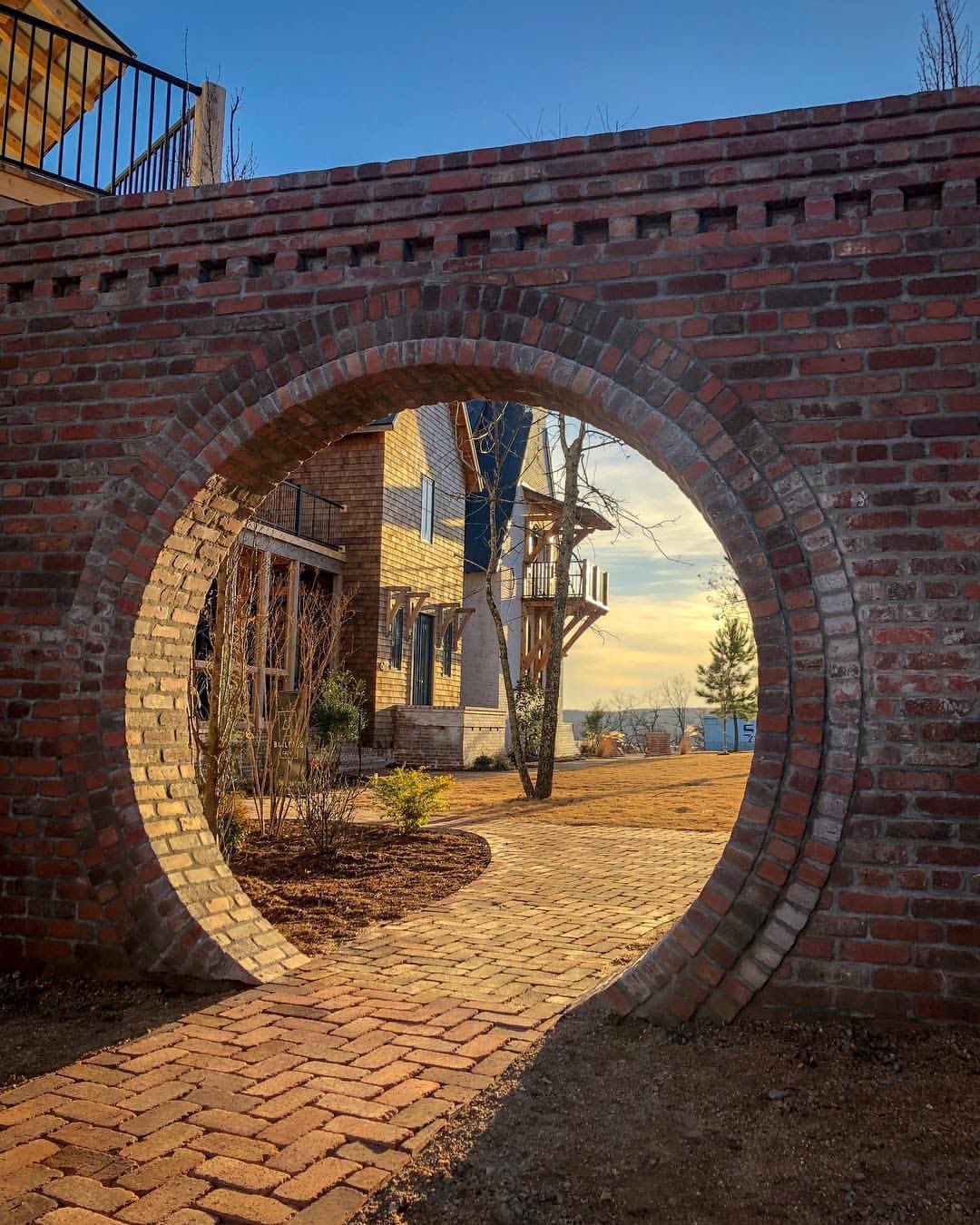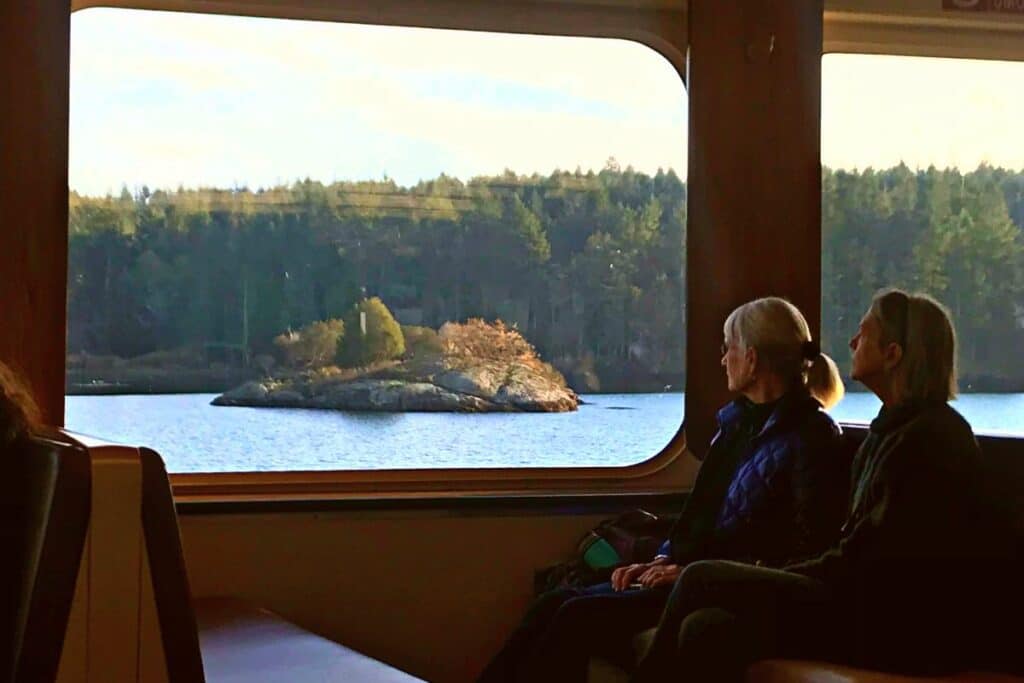Portals are Undertheorized
I'm not talking about fictional teleportation portals. I'm talking about portals in sense of passages between places. This post discusses a few types of portals and their psychological effects.
Threshold
Let's call all door-like things threshold portals. Gates, archways, doors, etc.
A threshold portal has two primary purposes: to divide spaces, and to frame spaces. A good threshold should induce movement. It should beckon the viewer to come closer, view the other space, and then step through.
I love Austin Tunnell's "Moongate" so much because it captures this idea perfectly. No matter what angle you see it from, you want to move around it and closer to it to see more. It pulls the viewer from one side of the threshold to the other.

Path
Beyond threshold portals, we have path portals you have to move through or along. These include hallways, tunnels, staircases, driveways, bridges, etc.
Here's the famous eucalyptus-lined Maliuhi Road that leads to the South Shore of Kauai. The trees form a beautiful tunnel as you approach the end of your drive.

If a threshold portal is a frame of the destination, a path portal is typically the promise of a destination. It's more subtle than a threshold. It should build anticipation.
Path portals also have an important role in memory, much more so than threshold portals. The mind is really good at episodic memories, and threshold portals don't typically have enough to make an episode — they can still be memorable, just in different ways!
If you ask people what they're excited about on their upcoming trip to Kauai and they've been before, they'll be mentally replaying the events of their last trip, and they'll remember the highway in the eucalyptus tree tunnel.
Passenger
Portals that require motion, but not action. Planes, trains, elevators, ferries, etc.
Here's a view from the ferry to San Juan Island north of Seattle:

A passenger portal is similar to a path portal, but since the viewer is passive, there is less of an element of exploration, but more of being in a liminal space between two worlds.
When you're on a train, plane, ferry, taxi, etc — you're essentially on a theme park ride. You can't affect the outside world. You can't make things faster or slower — you have to be on the ride for some fixed duration. You're in a snowglobe.
The best passenger portals have the anticipatory element of path portal, but replace active exploration with meditative elements.
Taking the ferry ride to a remote island allows the traveler to mentally leave behind the stress of the "real" world as they take this magic carpet — the ferry — to a new world where those problems and stress don't exist.
I've read that WW2 soldiers who returned by ship had lower rates of PTSD than those who came by plane. The hypothesis being that the ship gave the soldiers more time to decompress with their comrades before re-entering normal life.
Psychological
Portals that require no movement or much physical aspect at all, but take the person to a different mental state that causes them to view their environment in a different way, as if they had changed location. Common psychological portals are various religious rituals, drug-induced states, meditation, etc.
I'm particularly fond of ritual washing. It takes a lot of form factors, but most cultures have some version of it.
Jews have a hand-washing ritual before the Shabbat meal. Muslims make Wudu before prayer. Hindus bathe in the Ganges. Christians do Baptism. The Japanese have Chōzuya.
I think the best example of a ritual washing psychological portal is the Ancient Greek process at the Oracle of Delphi. Supplicants would first arrive at the Castalian Spring where they would begin to ritually purify themselves.
They would only be brought to see the priestess after days or even weeks of this. So imagine the psychological effect. You've traveled for weeks by boat and foot to get here — the anticipation builds. This would probably be your only visit to the oracle in your life. Then you finally bathe in the spring and start to meditate on the question you'll ask. Meditate on your life, your future.
While you're doing this, you see other pilgrims departing in a changed state. This becomes a self-fulfilling prophecy, as the new arrivals are convinced of the process by those who have already entered the altered state. Hypnosis works if you believe in it. It probably works even better if you live in a society that regularly consults oracles.
Conclusion
I like the Oracle of Delphi so much because it is a complete experience that incorporates all portal types.
You take a slow and meditative passenger portal by boat from your home to the Delphic coast, then hike miles along the coastal mountain roads forming a path portal to the Castalian Spring.
You spend days ritually purifying yourself in a psychological portal. You're then led the last few hundred meters to the Temple of Apollo where you step through a magnificent threshold portal and consult the Oracle in what is probably the most significant religious experience of your life.
Consider the opposite end of the portal quality spectrum: a strip mall.
You drive through traffic to get there. Upon arrival, you engage in a frustrating search for parking. The path to your destination is across an asphalt parking lot baking in the sun. You step through the threshold — a pair of sliding plexiglass doors and harsh fluorescent lighting. Any psychological experience you might have inside is interrupted by the sound of occasional car horns and motorcycle exhaust.
The lesson here is that portals represent a framework for developing places and the experiences people have with those places. These experiences can be beautiful or soulless. I choose beauty.